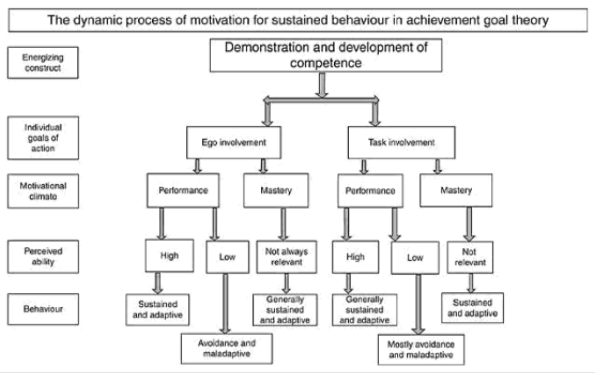Both of these mindsets can have positive and negative outcomes, depending on an individual's motivations for an action as well their ability to perform it. Both of these mindsets can be influenced by intrinsic (mastery) or extrinsic (performance) motivation sources, which can alter an individual's behaviours in various environments. If you are able to demonstrate a high level of performance (which is important to ego-orientation) or show mastery of a skill (which is important to task-orientation), behaviours and outcomes can be positive and sustained. However, if the ego-orientated mindset is paired with low skill or low competence compared to others in a performance setting, this can result in negative outcomes. This can result in maladaptive and avoidant behaviours, cheating, or ill-being. If an individual has a task-orientated mindset, is extrinsically motivated, but has a low ability level, this can also result in maladaptive behaviours. These mindsets can be fluid and can change depending on the context and past experiences of an individual, and you can show behaviours and thinking typical of both.
Mindsets which are either task- or ego-orientated can work in sync with one another and can result in great motivational profiles for athletes. It has been suggested that having high task and high ego orientations AND high task and low ego orientations have been shown to be the most sustainable mindsets and motivational profiles. However, athletes who display high ego and low task orientation are seen as most at risk of maladaptive behaviours. They may be prone to dropping or burning out when they believe they cannot demonstrate competence, especially against tough competition.
These states of either task- or ego-orientation can change from moment to moment based on the situation and depending on the athlete's perception. This can be affected by the current context, the athlete's existing thought patterns based on previous experiences, internal versus external motivation sources, and current goal-orientations. The environment's structure can make it more or less likely that a person will become task or ego-orientated through behaviours around achieving success or avoiding failure. A performance climate is created when success or failure are referenced from others and can be ego involved; for example, a race where the first and last place are determined, and superior ability is valued. A mastery climate is when success or failure is self-referenced, for instance, beating a personal record or successfully performing a skill (like juggling), where the individual perceives that their demonstration of mastery and learning is valued.
